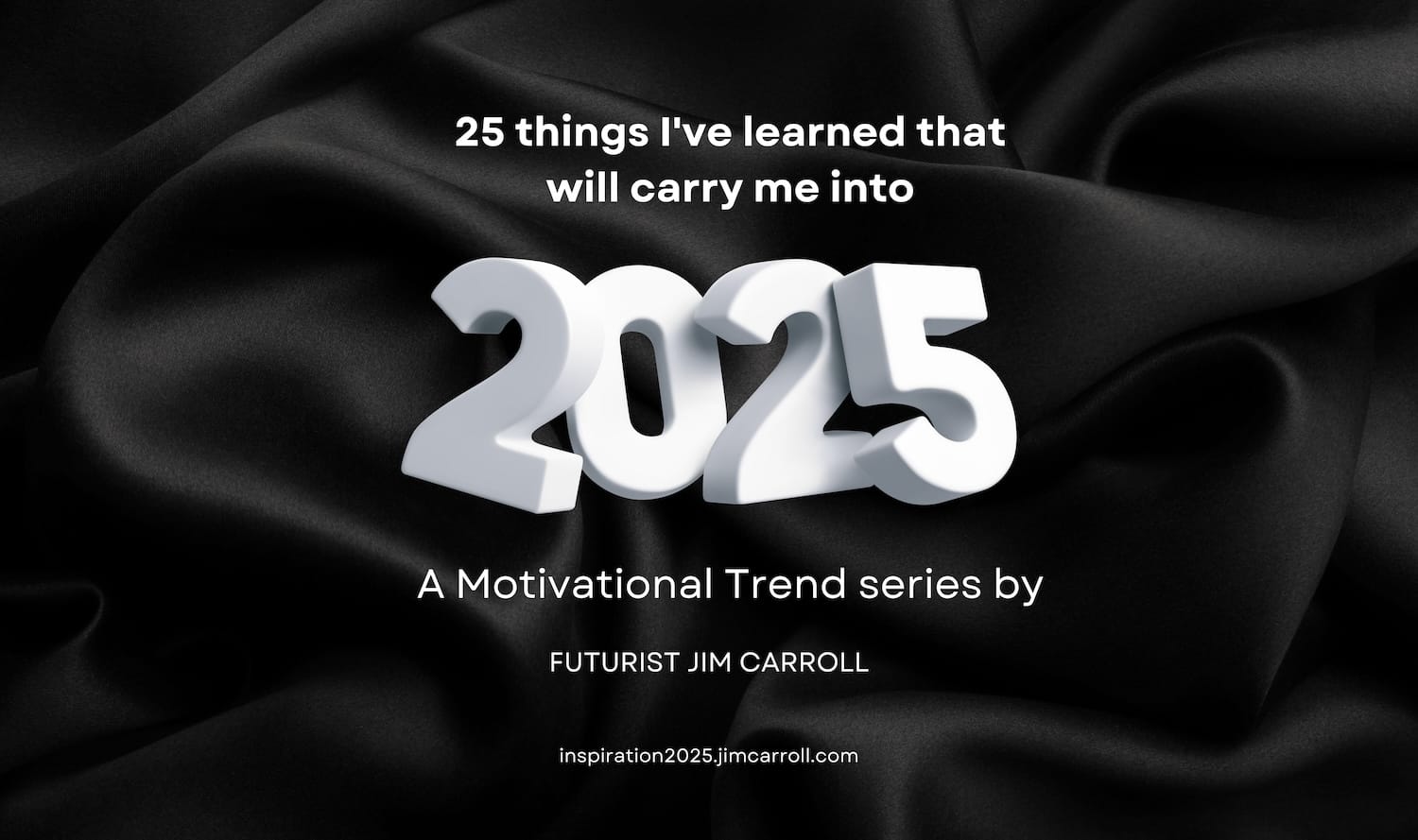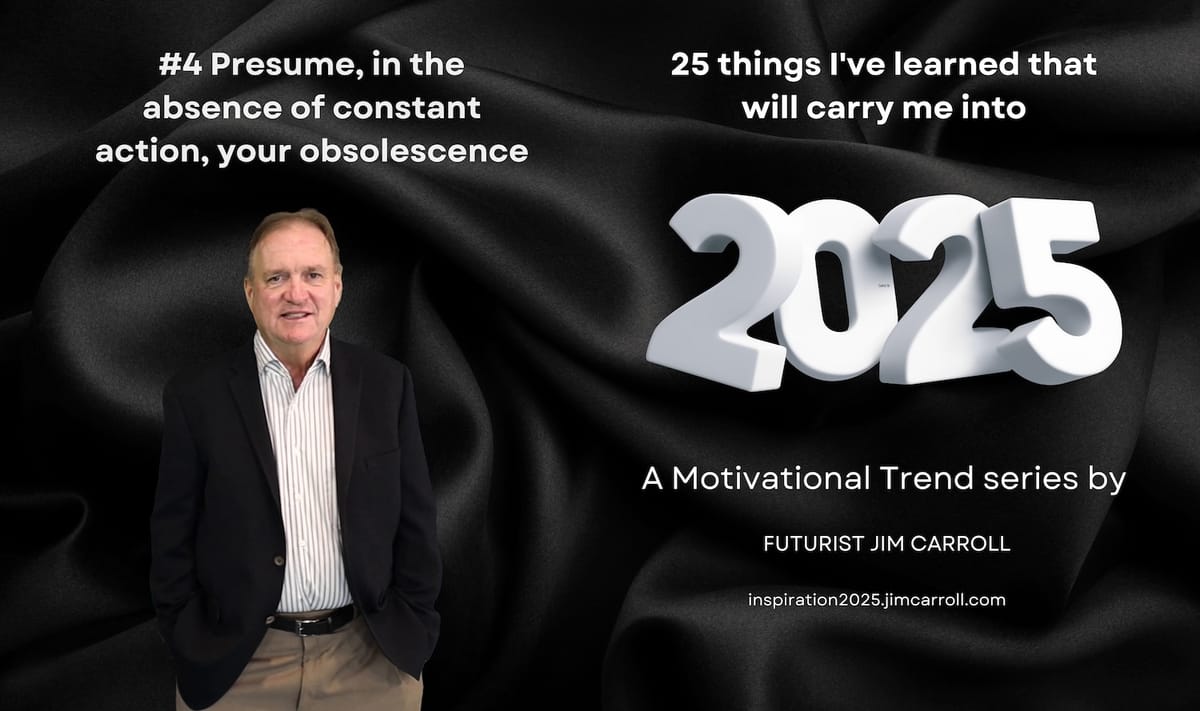"Presume, in the absence of constant action, your obsolescence" - Futurist Jim Carroll
Futurist Jim Carroll is writing a series, "25 Things I've Learned That Will Carry Me Into 2025." He is putting this together based on his 30-year career as a futurist, trends, and innovation expert, advising leaders of some of the world's most prestigious organizations on how to align to a faster future. He intends for the series to provide valuable guidance to others eager to learn how to move through a year that promises to be volatile, unpredictable, and full of uncertainty. Each day, the post will go out on multiple mailing lists, social media networks, and to the Website https://2025inspiration.jimcarroll.com

(I didn't like the image style I was using, so I've changed it!)
In 2025, as in other years, I'm going to presume that what I know at this very moment won't cut it tomorrow.
The same holds for you. Not to start this motivational bit of insight with a bit of a downer, but here are some facts that should guide you,
Not only should you presume your obsolescence, you should be guided by other realities.
Presume, in the absence of constant action, your irrelevance.
Presume, in the absence of constant action, your stagnation.
Presume, in the absence of constant action, your vulnerability.
Presume, in the absence of constant action, your insignificance.
Presume, in the absence of constant action, your redundancy.
Presume, in the absence of constant action, your regression.
Worse, presume, in the absence of constant action, your downfall.
Ok, so what's with that?
The fact is, relentless change means you can't presume that anything you are doing today will be relevant tomorrow, and so you need to be cognizant of a need to relentlessly reinvent.
In the context of the previous post about knowledge acceleration, consider a few tidbits.
Medicine is seeing the nonstop arrival of new forms of discovery, diagnosis, and treatment, a flood of new medical technologies and systems, and a regular stream of new pharmaceuticals. That means that in the field of healthcare, it is estimated that nurses need to learn new medical devices and monitoring systems every 1-2 years, while doctors must update treatment protocols every 3-6 months based on the latest research. At the same time, pharmacists must learn about new drug interactions and medications monthly, and medical technicians adapt to new diagnostic equipment annually.
Construction? It's all about sustainability, new energy systems, renewables, new materials, robotics, and technology. That means that architects learn new sustainable building materials and techniques yearly, new energy efficiency standards every 2-3 years, new building automation and smart home integration every 1-2 years, and updated structural analysis software and BIM tools every 6-12 months. The construction workers putting all of this new stuff in place have to master new skills involving new technologies and methodologies continuously - as well as learn how to work alongside all the new construction robots arriving on site.
Farming? It's all about science and tech, and with that, the field of precision agriculture is evolving so quickly, that it's estimated that they need a knowledge refresh each framing season. Not only that, but they have to learn about new pest management techniques annually, new crop varieties and genetics every planting season, and upgrade their skills with drone and automated equipment training every 1-2 years. Just wait until virtual 24-hour farming arrives, and today's Farmville-playing kid comes to manage real-life Farmville!
How about manufacturing? I often share the story from the stage that the typical machinist today is using machines that are so complex that they almost need to be able to do trigonometry in their heads. That means that machine operators need to learn new automation systems every 2-3 years, quality control standards annually, and new safety protocols every 6-12 months. Add robotics into the mix, and that leads to a need for robotics integration training every 1-2 years. Then there is 3d printing and other new manufacturing methodologies - suddenly, what you know now no longer matters.
Or financial planning? Insurance? Other financial services? New tax laws and regulations annually, investment products and vehicles every 6 months, and financial software platforms every 1-2 years. Automotive technicians? Because cars are essentially becoming computers on wheels, they need to learn about new vehicle systems annually, diagnostic equipment updates quarterly, and new trends with electric vehicle technology every 6 months.
Whoah.
I could go on - every single career, profession, skill, trade, and knowledge set is going out of date faster
Why is all of this happening? Because technology is coming to be the core of almost every industry, and technology is moving faster than ever before. But it's not just that - science is moving quicker, consumer preference is changing faster, and regulatory change evolves at a rapid pace. The tools we use, the vehicles we drive, the equipment that is part of our skill set - existing things become 'things from the olden days' faster while new things emerge.
The fact is, we live in a whirlwind of change, and what we did before won't cut it for what we need to do next. Constant action is needed to avoid obsolescence, regardless of our skill, profession, or role.
All this happens in the context that the very nature of the organizations we work for faces far less stability than before. It's estimated that the average lifespan of S&P 500 companies has decreased from 60 years in the 1950s to less than 20 years today. 52% of Fortune 500 companies from 2000 are now gone, largely due to digital disruption - and McKinsey research shows that the average company is being disrupted and falling out of market leadership position faster than ever before.
A speaker on a stage? I need to relentlessly update my research, my storyline and observations, the facts I share, and the disruptive ideas I put on the table. I need to adjust to the fact that the audience continues to change, skewing younger with a shorter attention span. I can't presume that my jokes for a room of baby boomers are going to work for a bunch of twenty-year-olds. I also know that the very technology used to support my presentation is going to continue to evolve, with more video, massive LED walls, and a lot more interactive technology. I am a person living with my looming obsolescence, and reinventing because of that knowledge.
Welcome to the world in which the future belongs to those who are fast!
The fact is, you should presume that faster obsolescence is now the default state of almost everything - and so you should presume that you just work harder to maintain your relevance.
It demands constant effort, adaptation, and reinvention.
Welcome to 2025!
Futurist Jim Carroll tries to reinvent himself regularly.

